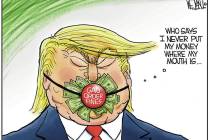Newspapers heading back to the future?
Journalism may be on the brink of coming full cycle.
At the dawn of the nation, newspapers were a far cry from our modern editions. Staying in business on the strength of subscription and advertising revenue alone was rare. Many managed to achieve profitability by capturing government printing jobs, which were doled out on a patronage basis.
To curry favor with the politicians and political parties, the newspapers were blatantly and unabashedly partisan, slathering their patrons with praise and the opposition with scurrilous accusations and criticisms.
The objectivity that is now a touchstone of modern journalism was then no virtue, but a vice.
"To profess impartiality here would be as absurd as to profess it in a war between virtue and vice, good and evil, happiness and misery," wrote William Cobbett in his Federalist newspaper, Porcupine's Gazette.
There were no editorial pages. Opinion was woven into the news reports.
In his account of George Washington's Farewell Address, Benjamin Franklin's grandson, Benjamin Bache, wrote in the Philadelphia Aurora, "If ever a nation was debauched by a man, the American nation has been debauched by Washington. If ever a nation has suffered from the improper influence of a man, the American nation has suffered from the influence of Washington. ... Let it serve as warning that no man may be an idol."
Eventually, as governments started to cut out the middleman and do the printing themselves, newspapers had to find another profit source.
With the advent of the penny press and its appeal to the masses with sensational and, yes, yellow journalism, publishers in this highly competitive endeavor could hardly afford to alienate half the readership with partisan political pandering. In such ignominious circumstances, the concept of objectivity was born.
But objectivity is not a basic, innate human trait. Frankly, fair and balanced and properly sourced can be, and often is, bland and boring.
In his book "The Media Monopoly," journalist and media critic Ben Bagdikian noted, "'Objectivity' tended to keep news superficial. ... It strained out interpretation and background despite the need for them in a century wracked by political trauma."
Fast forward into the murky dawning of the World Wide Web, where search engines send out "spiders" to find key words and meta tags, where advertising-supported Web sites find profit or loss through the number of "hits," and bloggers such as Matt Drudge point browsers to sites they find interesting.
Blogging on Time magazine's Web site, Michael Scherer recently displayed a dead-on knack for the obvious, offering rhetorical pondering on an actual set of circumstances.
"Assume, for the instance, that 12 news organizations do the same story on the same day about how Hillary Clinton has a tough road ahead of her to get the nomination," Scherer wrote. "Which story is going to get the most links and therefore the most readers? Is it the one that cautiously weighs the pros and cons, and presents a nuanced view of her chances? Or is it the one that says she is toast, and anyone who thinks differently is living on another planet?"
We all know the answer to that one. Or as Scherer summed up, "If you say something provocatively, in a new way, or with an unexpected spin, you will succeed online. If you play it safe, you will not."
The financial incentive to be objective, accurate, fair, complete and authoritative is outweighed by the rewards for outlandish, opinionated, reckless, raucous and over-the-top rhetoric delivered before the competition can post its own version.
If you can put it to music and add video of near-naked women, you can take it to the bank. It's all about the traffic. It's all about the hits. And the course of a civil and civic-minded society be damned.
An unsigned editorial in the current edition of the Columbia Journalism Review addresses some of the problems that arise from the digital world of "titillation and scoops." It noted that a California reporter was trying to cover a major murder and also send out blogs every 10 minutes. The pace resulted in grammatical, spelling and factual errors that undercut the newspaper's credibility.
The editorial concluded that saying something first might not be as valuable as first having something to say.
Is journalism evolving or reverting?
Stay tuned.
Thomas Mitchell is editor of the Review-Journal and writes about the role of the press and access to public records. He may be contacted at 383-0261 or via e-mail at tmitchell@reviewjournal.com.























